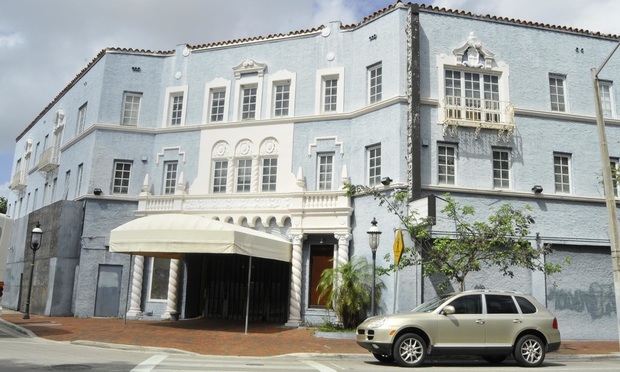 The Coconut Grove Playhouse. Photo: AM Holt
The Coconut Grove Playhouse. Photo: AM Holt
Miami-Dade County is taking its fight for its Coconut Grove Playhouse rehabilitation proposal to court after the city hit the brakes on it over concerns with the demolition plan.
The battle over how to proceed with the historic playhouse, which closed in 2006, pits county Mayor Carlos Gimenez against Miami Mayor Francis Suarez, City Commission Chairman Ken Russell and some residents.
The clash centers over a county proposal to demolish the 1,100-seat auditorium and build a 300-seat replacement — something preservationists staunchly oppose.
The county plans to keep the south and east facades, which it argues is the historically significant portion of the building originally modeled after a Spanish Rococo palace. The auditorium has been redone several times since the playhouse opened in 1927, losing much of its original design, the county argues.
Suarez and his camp argue architecturally significant elements in the auditorium such as Solomonic columns, Proscenium arches and cherubs would be lost.
The county filed a writ of certiorari petition on Monday night asking Miami-Dade Circuit Court to quash Suarez's veto because it violates due process and the essential requirements of the law and also isn't supported by competent substantial evidence.
[falcon-embed src="embed_1"]
Suarez and the city attorney's office had no comment by deadline.
The county first sought approval of its plan in April 2017 from the city's Historic and Environmental Preservation Board. The county needs the board's backing on a certificate of appropriateness because a portion of the building is covered by a city historic designation.
The city-designated historic portion is the front facade the county wants to restore and the city designation doesn't cover the interior of the auditorium, something the county often points to as part of its argument to demolish the auditorium.
Under city rules, only the historic front facade is protected from demolition. The playhouse also is on the National Register of Historic Places but that doesn't ban demolition.
The state owns the playhouse after its financial collapse. The county and Florida International University leased the building under an agreement that requires they reopen it with a smaller auditorium in 2022.
The plan has been on again, off again, ricocheting between the historic board, the City Commission and court for a second time in two years. Just this year, it was off, then on, then off and now in the hands of a panel of judges.
The city historic board on March 5 voted against the county's plan, but on May 8 the City Commission sided with the county after it appealed the board's vote.
Then, nine days later, Suarez vetoed the commission's vote. Standing behind a lectern in front of the playhouse, Suarez said the main reason he is vetoing is to preserve the playhouse. He added he thinks the county hadn't exhausted all its options before settling on the partial demolition.
“Just think about what an awful precedent that would set if all of our historic homes were demolished so that we could have big, white large boxes,” he said at the time. “I think it would kill the character and soul of this city.”
The county in its petition took issue with Suarez's arguments for his veto.
He argued that it was premature for the county to appeal to commissioners the historic board's denial. The county countered that the board's decision was final despite the board leaving the door open for the county to come back with a different plan. He argued that the county plan would jeopardize the playhouse's listing on the National Register. The county reiterated that it's the city's historic designation of the property, not the National Register's, that matters here. Suarez also said that the county failed to request demolition as it should have in its application, but the county countered that saying it explicitly marked a 'demolition' checkbox in its application.
Also, the county says that communications between Suarez and residents invested in the playhouse between the commission vote and the veto are ex parte communications.
The petition lays out the history of the county's plan.
The city in 2005 designated the front portion of the building, which would remain under the county's proposal, as historic.
Under the county plan this part would be restored and separated from the Arquitectonica-designed, 300-seat theater with a landscaped courtyard. The county has argued that a bigger auditorium won't be financially sustainable.
Its proposal includes a Miami Parking Authority garage.
The historic board in April 2017 OK'd the county's plan, although it placed conditions on it, but that approval was reversed after two Coconut Grove residents appealed it to the commission.
This opened the door for the commission to adopt a resolution in December 2017 requiring the preservation of the auditorium with at least 600 seats, essentially putting the brakes on the county plan.
Miami-Dade's petition is sprinkled with theater references and double entendres, including in a reference to a previous Miami-Dade Circuit Court panel's decision on the issue.
The city after the commission's December 2017 vote filed a petition for writ of certiorari, which it won. The panel of judges agreed that the two Grove residents had no standing to appeal the board's April 2017 decision. It also concluded that the city failed to give the county due process and that the city's historic designation doesn't include the building's interior.
“Dramatic theater rarely benefits from a sequel,” assistant county attorney James Kirtley Jr. wrote in the petition, a reference to the county winning its last petitio, “and this case proves no exception.”
Attorney David Winker, who has figured prominently in several big city issues by filings lawsuits, said he will file an amicus brief siding with the city and supporting the veto.
Winker called the lawsuit a “sandwich with no meat” and said the county and the city instead should work out a plan that works for all.
Winker said he will file on behalf of Anthony Vinciguerra and Courtney Berrien, a couple who owns a home less than 500 feet from the playhouse.
© Touchpoint Markets, All Rights Reserved. Request academic re-use from www.copyright.com. All other uses, submit a request to [email protected]. For more inforrmation visit Asset & Logo Licensing.







